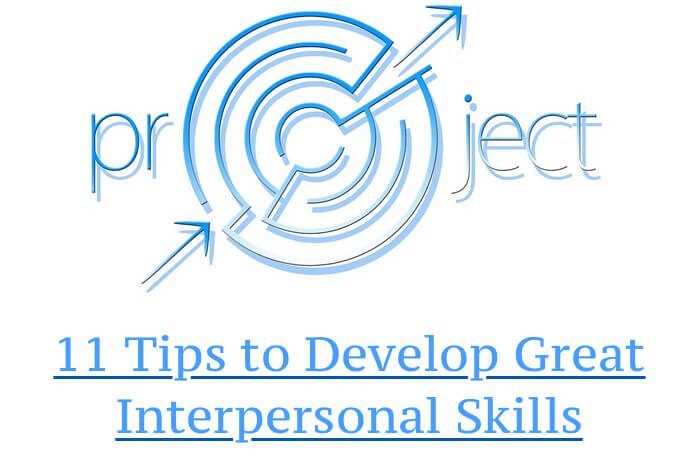How to Develop Great Interpersonal Skills
Often, we meet with people whom we have to relate with whether at work or at school, at home, in the market and in different places. The better we are at relating with these people we meet daily the more likely they are to like us and to appreciate us Having good interpersonal skills is something that cannot be underestimated because life is such that we are interdependent, no one is independent so we will always need each other, the more effective we are at relating with others the better life gets but not everyone seems to have these skills, some seem to be better at it than others but the good news is that good interpersonal skills can be developed over time. If you’re looking to how you can relate better with people around you, be you and employee or an employer, a father or a mother, a youth or an adult, this article on developing great interpersonal skills, could be of help.
Evaluate yourself
One important thing might be for you to evaluate yourself as regards interpersonal skills what are your weaknesses, you might have observed some weak points that you have when it comes to relating with others but it is also good for you to get feedback or opinions from others around you about how good or bad they think your interpersonal skills are. Don’t just try to assume or conclude about yourself by yourself, try to get outside view of you from others around you.
Be approachable and friendly
One of the important things to do is to smile, you should have a cheerful appearance and people should be able to easily approach you. Having an approachable outlook is something that will make people to easily see you as a friendly person, they will likely warm up to you, you don’t need to frown your face unnecessarily or put on a long face. Smile and be friendly.
Do not transfer aggression
Take for instance you are an employee and probably before going to work in the morning your spouse got you upset and then you carry that kind of mood to your office, it will affect the way you relate with people. What you need to do is to try and put that incident behind you and suspend whatever it is till after your working hours but then ensure that during your working hours you are your best. Relate properly with your co-workers. This is not just something only for employees, whomever you are, avoid transferring aggression. Also don’t put your problems and your head for everybody to see, avoid transferring aggression.
Show that you really appreciate others
People like to be appreciated. Appreciate others sincerely, try to see something good they’re doing or a good quality that they have and appreciate it. Let them know that you you’re not all selfish and looking out for yourself alone. This does not mean that you should flatter people or just try to tell them sweet things even if it’s not true, you should not come out as insincere, you should appreciate people genuinely. When people see that you appreciate them genuinely, they are likely to like you more and your interaction with them would be on a good plane.
Empathize
One good thing you can practice that can really help you with interpersonal relationship is to empathize. Empathy means that you are trying to see from the other person’s point of view, you’re putting yourself in their shoes to feel what they feel and see from their perspective, when you practice empathy, then you will know how to relate with others based on how they see things this will help you to communicate in a way that will make sense to them and to also have better relationship with them. Imagine you have to deal with youth and you do not put yourself in the youth’s shoes, then you might not be able to really help such or might not be able to communicate what you want to in a way that he or she will understand you. You will need to first come to his or her level and understand the way he or she thinks so that you can relate properly. Everyone has his or her own perspective, just expecting everyone to see things from your own perspective may not be a realistic expectation, and if you relate with people just based on yourself then you might not get their fancy.
Be assertive when you talk
When talking, stating your opinion or your idea, ensure that you state it without aggression. Be assertive without allowing aggression into your words also ensure that you are not passive. When people see you as a person who will say his mind or a mind in a calm and collected manner without allowing emotions to override your thoughts, they will respect you more. If you are aggressive people might not like you and being passive too is not good, you have to be able to say your mind and state your opinions or stand, but in the right way.
Do well to listen
Learn to listen to people when they talk. Sometimes all people need from you is just to listen to them, don’t keep trying to talk or say something when the other person is just wanting to tell you his or her mind. You can let all the other person know you are listening by sometimes asking a question as regards what he or she is telling you or you can refer to what he/she said before. By referring to what he/she has said before it will show to the other person that you are paying attention.
Pay due attention
Avoid being absent-minded when you are talking or in a conversation with someone else. Being absent-minded can put the other person off because he or she might be trying to tell you something and probably has been talking for some time and your mind has gone off to something else, the other person won’t like that if he/she discovers. If that continues to repeat itself, it will be seen as your usual habit which is not a good thing. Also avoid pressing your phone when talking to someone else, it could be somewhat rude and disrespectful. Always trying to give your full attention when talking or relating with another person.
Manage your emotions
One important part of interpersonal skills is for you to master control over your emotions. Don’t allow your emotions to override you anyhow, there are different things that could come up at work at home or anywhere you find yourself, good or bad, if you are unable to put your emotions under check they might just go haywire and you might misbehave or act hyper. Even if someone else does something that is offensive to you or that you do not like, you shouldn’t become aggressively angry and overreact, even if it is excitement, you should show it in the right manner, you should know how to manage your emotions so that you don’t come off as someone who is somewhat hyper.
Communicate clearly
Try to be clear when you communicate, ensure that you’re not misunderstood. In fact, it is good for you to find out from the other person to know whether you are properly understood.
Keep in touch
You should also practice the act of sustaining relationships. You’ve had friends probably in your high school/secondary school and then University/college on the probably in a former workplace, you can check up on them, they could be colleagues or friends, check up on them, probably put a call through, send an email, chat them up on WhatsApp or Facebook. Just try to keep in touch and keep the good connections alive, by doing that, those you are contacting will know that you still value the relationship.


